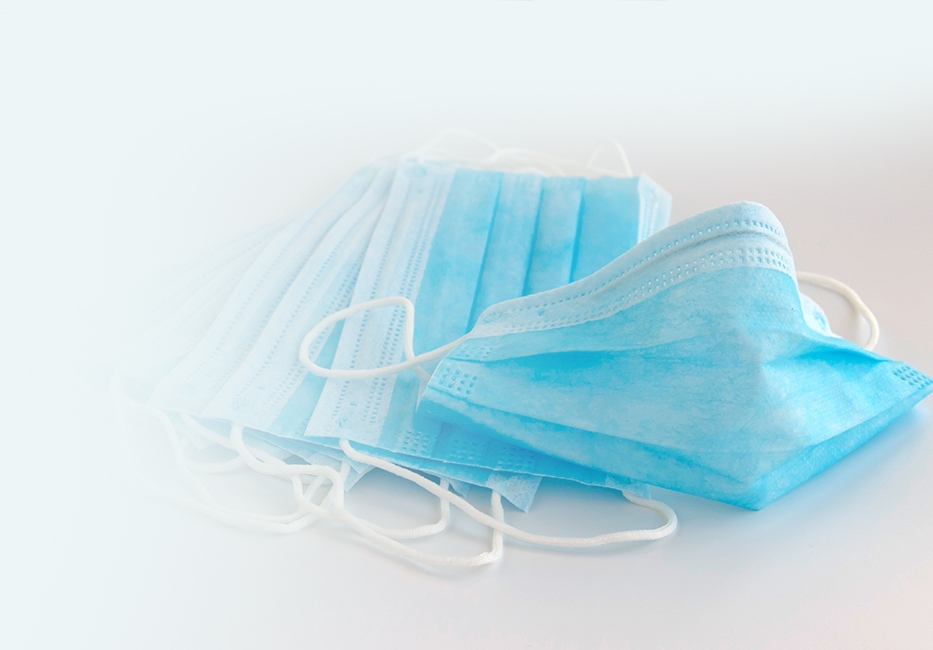Bank Holiday Delivery: Please note orders placed after Wednesday 16th April may not be delivered until after the Easter Bank Holiday.
- Home
- General Health
- Face Masks
Face Masks
Hygiene face masks are recommended for use in any situation where protection of the respiratory system is required.
The WHO guidance recommends FFP2 or FFP3 masks during outbreaks of infections such as SARS, Avian Flu and Coronavirus.
More Information
Masks for Sale - FFP2 and FFP3
FFP2 and FFP3 Masks are effective at preventing droplets of moisture from passing through their filters. If someone sneezes who has a Coronavirus infection, wearing FFP2 or FFP3 masks for sale should provide some protection against being infected. While it isn't a guarantee that you won't get sick, wearing a face mask provides better protection against COVID-19 than not wearing one.
Wearing a medical mask is one of the prevention measures to limit the spread of certain respiratory diseases, including 2019-nCoV, in affected areas. However, the use of a mask alone is insufficient to provide an adequate level of protection and other equally relevant measures should be adopted. If masks are to be used, this measure must be combined with hand hygiene and other IPC measures to prevent the human-to human transmission of 2019-nCov.
| Face Masks for Sale | Masks for Sale | Face Masks UK |
|---|---|---|
| Face Masks | Medical Face Masks | Buy Face Mask UK |
| Face Masks for Coronavirus | FFP3 Face Masks UK | Coronavirus Masks for Sale |
| FFP2 Face Masks | FFP3 Face Masks | FFP3 Masks |
Why Wear FFP3 Face Masks?
There are so many types of masks, it can be confusing which to wear. At UK Meds we have surgical masks, washable masks, FFP2 and FFP3. The top-end for filtration are FFP3 masks, and they are (at the time of writing) an affordable £7.50 above. Are these the best types of masks? It depends on your situation. The WHO doesn't recommend any particular type of mask, they consider cloth masks to be acceptable. However, there are some situations where you may want the best mask for filtering coronavirus. You may already be infected, or are treating someone who has been infected. If that is the case, wearing the best filtration face mask (FFP3) makes sense.
The type of mask you should wear may change depending on your circumstances. If you are mostly outdoors and people are practising social distancing, surgical masks may be sufficient. If you are in enclosed places for extended periods of time with people who may be infected, you can consider using a mask that has better filtration. There are no exact guidelines -- as mentioned, the WHO is recommending a minimum of cloth masks and there are no regulations for quality of filtration.
What is a FFP3 Mask?
FFP3 masks, also called N99 masks, are able to filter 99% of particles that are the size of respiration droplets, which are Covid-19's main method of being spread. This is the highest level of filtration that is practical for day-to-day wearing for protection from the Coronavirus. This differs from FFP2 (N95) masks in that those masks filter 95% of airborne particles the size of respiration droplets.
Masks for Sale
Where can you buy FFP3 masks in the UK? Get them here at UK Meds. FFP3 surgical masks are available here for sale. If you would like to know where to buy health face masks, get them from UK Meds. We have overnight shipping most nights of the week.
- Best Face Mask for Protection Against Virus
- Best FFP2 Masks
- Buy Coronavirus Face Masks
- Buy Face Mask UK
- Disposable Protective Face Coverings Made in UK
- Face Mask for Virus
- Face Masks for Sale UK
- Facial Masks for Coronavirus
How to Wear a Mask for Coronavirus
- Medical masks should be worn by health workers and those caring for someone with Covid-19 symptoms and persons age 60 and over. They should be used by anyone with pre-existing medical conditions as they are at greater risk of developing serious illness.
- People who have symptoms suggestive of Covid-19, before touching the mask, clean your hands with alcohol-based hand rub or soap and water. Inspect the mask for tears or holes. Do not use a mask that has previously been worn or is damaged.
- Verify which side is the top. This is usually where the metal strip is. Identify the inside of the mask which is usually the white side. Place the mask on your face covering your nose mouth and chin, making sure there are no gaps between your face and the mask.
- Pinch the metal strip so that it molds to the shape of your nose. Remember, do not touch the front of the mask while using it to avoid contamination. If you accidentally touch it, clean your hands.
- Before touching the mask, once again, ensure that you clean your hands with alcohol-based hand rub or soap and water.
- Remove the straps from behind the head or ears without touching the front of the mask.
- As you remove the mask, lean forward and pull the mask away from your face.
- Masks for sale are for single use only. Discard the mask immediately, preferably into a closed bin.
- Clean your hands after touching the mask.
- Always be aware of the condition of the mask. Replace it if it gets soiled or damp.
- maintaining at least one meter distance from each other
- washing your hands frequently and avoid touching your eyes mouth and nose while wearing a mask
- stay safe and help prevent the spread of Covid-19
- avoid crowds
- wash your hands thoroughly and use sanitiser gel
- maintain distance from anyone exhibiting symptoms such as coughing or sneezing
- cover your mouth with your inner elbow or tissue paper when coughing or sneezing
- refrain from touching your mouth or nose
- How to Wear a Face Mask Properly
- How to Clean N95 Face Masks
- N95 vs N99 vs Surgical Masks
- Could Wearing Face Masks Be The New Norm?
- What types of face masks are helpful during the coronavirus pandemic?
- What's the difference between valved and unvalved face masks?
- Are surgical masks effective at preventing the spread of COVID-19?
- Should you wear a face mask in public? The science says yes
- The Role of PPE In Fight Against Covid-19
- Does wearing disposable gloves help prevent coronavirus?
- Hand Sanitisers and Other Personal Protective Equipment
- How Do Hand Sanitisers Help vs Coronavirus?
- Spring Cleaning During a Pandemic
- Hand Sanitiser vs Soap and Water vs Coronavirus
- What are N95 Masks?
- Protecting Yourself From Coronavirus
- How Effective Are Face Masks?
- Difference Between FFP1, FFP2 and FFP3 Face Masks
- Why Is There a Shortage of Face Masks?
- Things not to do during the COVID-19 outbreak
- Should i wear a mask to protect against coronavirus?
How to Take a Face Mask Off
A mask alone cannot protect you from Covid-19. It must be combined with other measures, including:
Surgical Face Masks for Sale
We sell surgical face masks here. This type of mask is a looser-fitting (and easier to breathe in) mask which is less expensive, as it is sold in packs of 50. This is an excellent option if you find it difficult to breathe in the higher filtration masks discussed below. This type of mask is sufficient to ride buses and meet the requirements of establishments which require a mask to enter their facility.
FFP2 (N95) Masks for Sale
You can find N95 (FFP3) masks for sale at this link. This type of mask is suitable in situations where you will come into contact with potentially infected individuals in indoor situations. This is the type of mask filters 95% of airborne particles the size of respiration droplets that carry the coronavirus.
Buy FFP3 Masks
The highest level of filtration is provided by FFP3 (N99) masks. You can find these masks for sale here at UK Meds. Simply browse the masks for sale we have featured above and look for the FFP3/N99 masks.
| Buy Face Masks UK | Hygiene Face Masks |
|---|---|
| FFP2 Mask For Coronavirus | Face Masks UK |
| Buy Face Masks | FFP3 Surgical Masks |
| Medical Face Masks UK | Where to buy health face masks |
| FFP2 masks buy | FFP3 mask for Coronavirus |
Other Protective Measures Beyond Face Masks
Face masks should not be the only method of avoiding the Coronavirus. The following are some things you should consider in conjunction with wearing a FFP2 or FFP3 face mask:
How to Use a Face Mask
Proper use of face masks is critical for those who wish to avoid being sick. Almost counter-intuitively, wearing a face mask may actually cause an infection if not worn properly. This is because people who wear a face mask are more likely to continually touch their face. It is important that, if you are wearing a face mask, to avoid touching the mask after it has been put in place over your head.
Which is better, FFP2 or FFP3 masks?
An FFP3 face mask will offer better filtration than an FFP2 mask. FFP3 face masks are more expensive. The WHO recommends FFP2 for health workers. You can buy FFP2 face masks from UK Meds.
use a particulate respirator at least as protective as a US National Institute for Occupational Safety and Health (NIOSH)-certified N95, European Union (EU) standard FFP2, or equivalent, when performing aerosolgenerating procedures such as tracheal intubation, noninvasive ventilation, tracheotomy, cardiopulmonary resuscitation, manual ventilation before intubation, and bronchoscopy.
FFP3 filters are also recommended against Coronavirus.
The FFP3 face masks differ from the common surgical kind as they are both thicker and come with a filter. FFP3 masks are made of a synthetic fibre, which allows them to filter out finer particles. The valve on the front of the mask also releases air, preventing moisture build-up which causes other models to deteriorate.
You can buy FFP3 face masks from UK Meds.
Where to Buy Face Masks for Coronavirus in the UK
Here at UK Meds, you can buy FFP2 and FFP3 face masks. We have overnight shipping most nights of the week. As you are checking out with your face mask, you can see the date your mask should be delivered.
Learn More:
Medication delivered the next day from UK pharmacies



Choose the right treatment
From the comfort of your own home or out on the go, choose the treatment you require from our extensive range.
Complete an online consultation
A vital part of our process, your online consultation will be similar questions to that of a GP. Quick and easy, we guarantee privacy and confidentiality.
Delivered discreetly
One of over 100 of our partner regulated UK pharmacies will dispense and ship the treatment to you in discreet packaging.
Rated out of 5 on 
Speedy delivery
Excellent! Fast delivery product as stated
There was a slight delay in the delivery of the first order, that could be because of the weekend. The second delivery was quick and easy
Always excellent service -Thankyou
Rated 4.6 out of 5 based on 6398 reviews
Here to help you
Our Customer Service is available Monday to Friday 9am - 5pm. If you need urgent assistance, do not use this service. Call 111, or in an emergency call 999. Visit our help section


